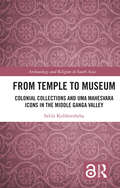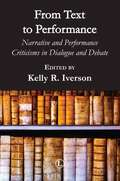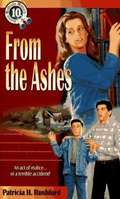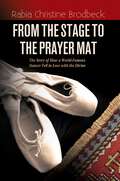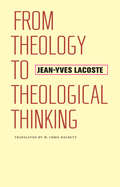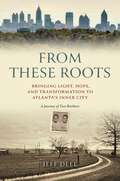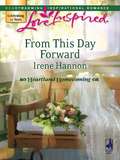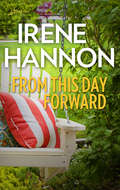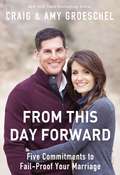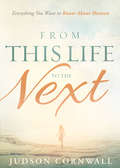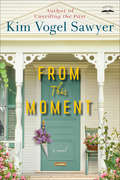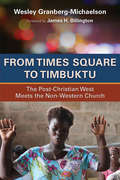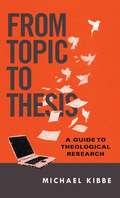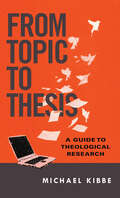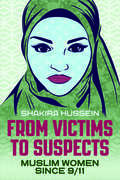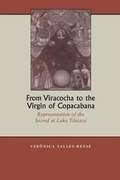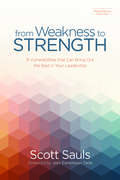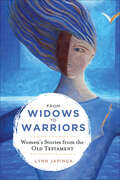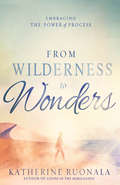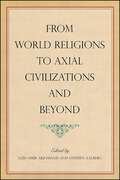- Table View
- List View
From Temple to Museum: Colonial Collections and Umā Maheśvara Icons in the Middle Ganga Valley (Archaeology and Religion in South Asia)
by Salila KulshreshthaReligious icons have been a contested terrain across the world. Their implications and understanding travel further than the artistic or the aesthetic and inform contemporary preoccupations.This book traces the lives of religious sculptures beyond the moment of their creation. It lays bare their purpose and evolution by contextualising them in their original architectural or ritual setting while also following their displacement. The work examines how these images may have moved during different spates of temple renovation and acquired new identities by being relocated either within sacred precincts or in private collections and museums, art markets or even desecrated and lost. The book highlights contentious issues in Indian archaeology such as renegotiating identities of religious images, reuse and sharing of sacred space by adherents of different faiths, rebuilding of temples and consequent reinvention of these sites. The author also engages with postcolonial debates surrounding history writing and knowledge creation in British India and how colonial archaeology, archival practices, official surveys and institutionalisation of museums has influenced the current understanding of religion, sacred space and religious icons. In doing so it bridges the historiographical divide between the ancient and the modern as well as socio-religious practices and their institutional memory and preservation. Drawn from a wide-ranging and interdisciplinary study of religious sculptures, classical texts, colonial archival records, British travelogues, official correspondences and fieldwork, the book will interest scholars and researchers of history, archaeology, religion, art history, museums studies, South Asian studies and Buddhist studies.
From Temple to Museum: Colonial Collections and Umā Maheśvara Icons in the Middle Ganga Valley (Archaeology and Religion in South Asia)
by Salila KulshreshthaReligious icons have been a contested terrain across the world. Their implications and understanding travel further than the artistic or the aesthetic and inform contemporary preoccupations.This book traces the lives of religious sculptures beyond the moment of their creation. It lays bare their purpose and evolution by contextualising them in their original architectural or ritual setting while also following their displacement. The work examines how these images may have moved during different spates of temple renovation and acquired new identities by being relocated either within sacred precincts or in private collections and museums, art markets or even desecrated and lost.The book highlights contentious issues in Indian archaeology such as renegotiating identities of religious images, reuse and sharing of sacred space by adherents of different faiths, rebuilding of temples and consequent reinvention of these sites. The author also engages with postcolonial debates surrounding history writing and knowledge creation in British India and how colonial archaeology, archival practices, official surveys and institutionalisation of museums has influenced the current understanding of religion, sacred space and religious icons. In doing so it bridges the historiographical divide between the ancient and the modern as well as socio-religious practices and their institutional memory and preservation. Drawn from a wide-ranging and interdisciplinary study of religious sculptures, classical texts, colonial archival records, British travelogues, official correspondences and fieldwork, the book will interest scholars and researchers of history, archaeology, religion, art history, museums studies, South Asian studies and Buddhist studies.
From Temple to Tent: From Real to Virtual World (Exodus 24:15 - Numbers 10:28)
by Sarah L. HartThe principal interest of the text on the tabernacle tent, Exodus 24:15 - Numbers 10:28, is Israelite worship-cultic place, the cultic people, and laws for the regulation of cultic life. The method followed is description of the biblical text and collation of the evidence as would a classicist go about classifying an ancient Greek Vase. The findings reveal a virtual world of Israelite cult. The transportable tabernacle tent with its courtyard and altar resembles a temple in its complexity. Through words the reader is invited into the atmosphere of the tabernacle tent where all the senses are evoked. The beautifully embellished fore-room of the tent illuminated by the light of the lamp-stand is seen, the waft of incense smelt, the atmosphere of fear or attraction that emanates from the epicentre of holiness felt. The tabernacle tent is constructed of words, not of stones. It is indestructible and does not succumb to the vagaries of time, as pristine today as it was over 2,500 years ago when it was first created.
From Text to Performance: Narrative and Performance Criticisms in Dialogue and Debate
by Edited by Kelly R. IversonFor the last two centuries, biblical interpretation has been guided by perspectives that have largely ignored the oral context in which the gospels took shape. Only recently have scholars begun to explore how ancient media inform the interpretive process and offer an understanding of the Bible. The contributors to From Text to Performance recognise that the Jesus tradition was a story heard and performed, and seek to re-evaluate the constituent elements of narrative, including characters, structure, narrator, time, and intertextuality, within this performative context. In dialogue with traditional literary approaches, these essays demonstrate that an appreciation of performance yields fresh insights distinguishable in many respects from results of literary or narrative readings of the gospels.
From The Ashes (Jennie McGrady Mystery #10)
by Patricia H. RushfordBook 10 in the Jennie McGrady Mysteries for young adults. When her church and school are destroyed by fire, speculations mount and Jennie smells foul play, but why would anyone target a diverse church like Trinity? With overtones of racism and issues of color, be it African American or Hispanics, there are no lack of suspects with hate seemingly everywhere. Hospitals and kidnapping hinder Jennie's ability to help her dad get to the bottom of this horrible deed and the bodies left in its wake.
From The Stage To The Prayer Mat
by Rabia Christine BrodbeckGracefully chronicling one Western woman's attraction to the universal charm of Islam and the Prophet Muhammad, this inspirational memoir chronicles why and how Brodbeck journeyed from the exciting world of modern dance in New York City to Istanbul, where she lovingly embraced Islam.
From Theology to Theological Thinking (Richard Lectures)
by Jeffrey Bloechl Jean-Yves Lacoste W. Chris Hackett"Christian philosophy" is commonly regarded as an oxymoron, philosophy being thought incompatible with the assumptions and conclusions required by religious faith. According to this way of thinking, philosophy and theology must forever remain distinct.In From Theology to Theological Thinking, Jean-Yves Lacoste takes a different approach. Stepping back from contemporary philosophical concerns, Lacoste--a leading figure in the philosophy of religion--looks at the relationship between philosophy and theology from the standpoint of the history of ideas. He notes in particular that theology and philosophy were not considered separate realms until the high Middle Ages, this distinction being a hallmark of the modern era that is coming to an end. Lacoste argues that the intellectual task before us now is to work in the frontier region between or beyond these domains, work he identifies as "the task of thinking." With this argument, Lacoste resets our understanding of Western Christian thought, contending that a new way of thinking that is at once philosophical and theological will be the lasting discourse of Christianity.
From These Roots: Bringing Light, Hope, and Transformation to Atlanta's Inner City—A Journey of Two Brothers
by Jeff DeelPart memoir, part inspirational, Jeff Deel&’s From These Roots tells of his sometimes michievous childhood as the son of a holiness preacher and the change of heart and events that led him as an adult to work alongside his brother, ministering to the lost and forgotten people of Atlanta&’s inner city.Through Jeff&’s stories from his own past, along with those of the countless transformations he has witnessed at City of Refuge, readers will see how being a follower can be just as important as being a leader. Jeff Deel has lived in the shadow of his older brother, Bruce, for his entire life. He wouldn&’t have had it any other way. While being the sons of a holiness preacher, they still found ways to get into their fair share of mischief, with older brother Bruce taking on the role of &“leader&”—for better or worse. Yet Jeff never questioned his place as his brother&’s follower and supporter—for better or worse. Then came adulthood and Jeff&’s turbulent search to find himself. Through a series of failed occupations and the desire to avoid ministry at all costs, Jeff was predictably led right back to his brother&’s side. This time, instead of finding mischief, Jeff and Bruce worked together building the City of Refuge in Atlanta. Through their work, COR has welcomed thousands upon thousands of individuals who have found themselves in dire straits, whether as victims of abuse and sex trafficking, or as people whose own choices have thrust them to rock bottom. Jeff and Bruce have found their experience watching their parents minister to the least of these and teaching them what it means to offer a person dignity, love, and hope, prepared them more than they ever could have realized.
From This Day Forward
by Irene HannonIt Was A Shocking Proposal. . . But Cara Martin had to say yes. After a frightening ordeal, she needed a safe haven, and her estranged husband, Dr. Sam Martin, offered to share his home. Live with Sam? The man she'd married had become a stranger long before their separation had broken her heart. Yet when she arrived in his small Missouri town, Cara discovered the workaholic surgeon had become a general doc who cared about people. . . cared about her. Could they possibly love, honor and cherish each other again, from this day forward?
From This Day Forward
by Irene HannonIt was an offer she couldn’t refuse…After a frightening ordeal, Cara Martin needs a safe haven, and her estranged husband, Dr. Sam Martin, offers to share his home. Live with Sam? The man she’d married became a stranger long before their separation broke her heart. Yet when she arrives in his small Missouri town, Cara discovers the workaholic surgeon has become a general doctor who cares about people...cares about her. Can they possibly love, honor and cherish each other again, from this day forward? Originally published in 2007
From This Day Forward Study Guide: Five Commitments to Fail-Proof Your Marriage
by Craig GroeschelIs it possible to have a great marriage? Yes, but it is not likely if you treat marriage like everybody else does! In this five-session, video-based small group study, New York Times bestselling author and pastor Craig Groeschel gives you five commitments to make in order to fail-proof your marriage. You know the stats, and they are horrifying. 50% of marriages don’t make it. What other area of your life are you satisfied with 50% odds against you? The choices you make each and every day determine not only your relationship with God but also the quality of your marriage. The decisions you make today will determine the marriage you will have tomorrow. In this five-session study, you will discover five commitments that will absolutely fail-proof your marriage. If you make these commitments, you can and will have the marriage God wants you to experience. Seek God Fight Fair Have Fun Stay Pure Never Give Up If you and your spouse will earnestly choose to do all five of these things, you’ll discover a richer, deeper, more authentic relationship and a more rewarding, more passionate love life than you could have ever imagined. Don’t be a statistic. Don’t be average. Let’s get you that marriage that you always wanted. Starting right now—from this day forward.
From This Day Forward: Five Commitments to Fail-Proof Your Marriage
by Craig Groeschel Amy GroeschelShouldn't there be more to marriage than flipping a coin to see if it will last? Is it possible to grow more in love with the person you've committed your life to? Would you like to guarantee that your marriage will last? Craig and Amy Groeschel offer singles pursuing marriage and couples at all stages of marriage five commitments to fail proof their marriage, From This Day Forward.
From This Life to the Next: Everything You Want to Know About Heaven
by Judson CornwallUnfortunately heaven has become more of an enigma than an anticipated destination. Although you may have seen many depictions of glorious heavenly scenes in movies and heard awe-inspiring testimonials of near- and after-death experiences, you may still be apprehensive about the afterlife.Heaven is no longer a mystery Culled from Cornwall&’s extraordinary teachings over years of ministry, From this Life to the Next challenges many preconceived ideas about heaven. It claims that the moment of stepping from this life into the next should not be one we dread or fear because Jesus said that He would be there to meet us, and His presence will be our joy. Your pressing questions about heaven will be answered such as:Is heaven a real place?What is heaven like?Where is heaven, and how do we get there?What will my body look like?Will I recognize loved ones?REMOVE THE FEAR OF DEATH and the afterlife and rekindle the excitement to one day meet Jesus and dwell in His presence for eternity.
From This Moment: A Novel
by Kim Vogel SawyerA lost ring brings together two wounded souls—a youth minister haunted by the past and a spunky church custodian—in this heartwarming romance from the bestselling author of The Librarian of Boone&’s Hollow. &“Kim Vogel Sawyer is an amazing storyteller who crafts each of her stories with page-turning excitement and rich character development.&”—Tracie Peterson, bestselling author of the Golden Gate Secrets seriesGrowing up in the foster care system, Jase Edgar always dreamed of one day starting his own family. But his fiancée's untimely death shattered his plans. Moving to Kansas and serving as a youth minister should be a fresh start, but he can't seem to set aside his doubts about God's goodness long enough to embrace his new life. Newly-appointed church custodian, Lori Fowler is battling her own challenges. Her strained relationship with her father and her struggles with overeating convince her she's not worthy enough for love. When an Amish weaver enlists their help locating the owner of a ring found among the donated clothing she uses as fabric, Jase and Lori find themselves drawn to each other. But will they be able to release the past and move forward from this moment into a joyful future?
From Times Square to Timbuktu: The Post-Christian West Meets the Non-Western Church
by Wesley Granberg-MichaelsonIn the last century, amazingly, world Christianity's center of gravity has effectively moved from Europe to a point near Timbuktu in Africa. Never in the history of Christianity has there been such a rapid and dramatic shift in where Christians are located in the world.Wesley Granberg-Michaelson explores the consequences of this shift for congregations in North America, specifically for the efforts to build Christian unity in the face of new and challenging divisions. Centers of religious power, money, and theological capital remain entrenched in the global, secularized North while the Christian majority thrives and rapidly grows in the global South. World Christianity's most decisive twenty-first-century challenge, Granberg-Michaelson argues, is to build meaningful bridges between faithful churches in the global North and the spiritually exuberant churches of the global South.Watch the trailer:
From Topic to Thesis: A Guide to Theological Research
by Michael KibbeWhile courses in Bible and theology typically require research papers, particularly at the graduate level, very few include training in research. Professors have two options: use valuable class time to teach students as much as they can, or lower their standards with the understanding that students cannot be expected to complete tasks for which they have never been prepared. From Topic to Thesis: A Guide to Theological Research offers a third option. This affordable and accessible tool walks students through the process, focusing on five steps: finding direction, gathering sources, understanding issues, entering discussion and establishing a position. Its goal is to take students directly from a research assignment to a research argument―in other words, from topic to thesis.
From Topic to Thesis: A Guide to Theological Research
by Michael KibbeWhile courses in Bible and theology typically require research papers, particularly at the graduate level, very few include training in research. Professors have two options: use valuable class time to teach students as much as they can, or lower their standards with the understanding that students cannot be expected to complete tasks for which they have never been prepared. From Topic to Thesis: A Guide to Theological Research offers a third option. This affordable and accessible tool walks students through the process, focusing on five steps: finding direction, gathering sources, understanding issues, entering discussion and establishing a position. Its goal is to take students directly from a research assignment to a research argument—in other words, from topic to thesis.
From Victims to Suspects: Muslim Women Since 9/11
by Shakira HusseinDrawing on interviews and examples from across the globe, this book tackles the shifting narratives surrounding Muslim women Once regarded as passive victims waiting to be rescued, Muslim women are now widely regarded as arbiters of "terror" and a potential threat to be kept under control. Drawing on interviews and examples from around the world including Afghanistan, Pakistan, Europe, and North America, Shakira Hussein shows how this shift in attitude has taken place and how it impacts feminism, multiculturalism, race, and religion on a global scale. She argues that alongside the fear of Islamic terrorism is a growing fear of Islam as a cultural hazard that is undermining Western society from within. Muslim women, the transmitters of cultural practices, are frequently seen to play a key role in this. Hussein’s work makes for a compelling read, offering a unique perspective on what it means to be a Muslim woman post-9/11.
From Violence to Wholeness: A Ten-Part Process in the Spirituality and Practice of Active Nonviolence
by Ken Butigan Patricia BrunoThis is the workbook to accompany a ten-part "process" on nonviolence, designed by the Pace e Bene Nonviolence Service. The book can be used by both group leaders and participants. The program comes from a Christian framework, but emphasizes respect for all people and religions. Each session includes a series of exercises and topics for discussion designed to deepen participants' thinking about the violence in the world - both global and personal - and nonviolent alternatives. Suplemental readings include work by Gandhi, Martin Luther King Jr., St. Francis of Assissi, and the feminist antinuclear activist Shelley Douglas, among others.
From Viracocha to the Virgin of Copacabana: Representation of the Sacred at Lake Titicaca
by Verónica Salles-ReeseSurrounded by the peaks of the Andean cordillera, the deep blue waters of Lake Titicaca have long provided refreshment and nourishment to the people who live along its shores. From prehistoric times, the Andean peoples have held Titicaca to be a sacred place, the source from which all life originated and the site where the divine manifests its presence. <P><P> In this interdisciplinary study, Verónica Salles-Reese explores how Andean myths of cosmic and ethnic origins centered on Lake Titicaca evolved from pre-Inca times to the enthronement of the Virgin of Copaca-bana in 1583. She begins by describing the myths of the Kolla (pre-Inca) people and shows how their Inca conquerors attempted to establish legitimacy by reconciling their myths of cosmic and ethnic origin with the Kolla myths. She also shows how a similar pattern occurred when the Inca were conquered in turn by the Spanish.
From Weakness to Strength: 8 Vulnerabilities That Can Bring Out the Best in Your Leadership
by Joni Eareckson Tada Scotty Smith Scott SaulsIn this honest book, pastor and author Scott Sauls exposes the real struggles that Christian leaders and pastors regularly face. Sauls shares his own stories and those of other leaders from Scripture and throughout history to remind us that we are human, we are sinners, and we need Jesus to help us thrive as people and leaders. For Christian leaders—both inside and outside of the church—weaknesses that are left unchecked can lead to a downfall that is both public and painful. They want to lead with character and live like Jesus, but ambition, isolation, criticism, envy, anticlimax, opposition, restlessness, and insecurity can get in the way. From Weakness to Strength provides leaders with tools to draw near to Jesus and stay encouraged and hopeful, even (and especially) when sin and struggle get in the way.
From Whom No Secrets Are Hid: Introducing the Psalms
by Walter BrueggemannThe Psalms express the most elemental human emotions, representing situations in which people are most vulnerable, ecstatic, or driven to the extremities of life and faith. Many people may be familiar with a few Psalms, or sing them as part of worship. Here highly respected author Walter Brueggemann offers readers an additional use for the Psalms: as scripted prayers we perform to help us reveal ourselves to God.
From Widows to Warriors: Women's Stories From The Old Testament
by Lynn Japinga<p>For too long the women of the Bible have been depicted in one-dimensional terms. On one side are saints, such as Mary, while on the other are "bad girls," such as Eve and Jezebel. Just as often, the female characters of the Bible are simply ignored. However, the women of the Bible are complex, multidimensional individuals whose lives are inspiring, funny, and tragic in ways too many of us never hear.</p><p>In this first of two volumes, Lynn Japinga acquaints us with the women of the Old Testament. From flawed heroes like Ruth and Rahab to fierce fighters like Deborah and Jael to tragic characters like Jephthah's daughter and the unnamed concubine of the book of Judges, readers will encounter a wealth of foremothers in the faith in all their messy, yet redeemable, humanity. This Bible study introduces and retells every female character who contributes to one or more Old Testament stories, diving deeply into what each woman's story means for us today with questions for reflection and discussion.</p>
From Wilderness to Wonders: Embracing the Power of Process
by Katherine RuonalaAre you praying for a loved one to be saved? Are you anticipating the fruition of a dream or desire? In those times when you are waiting for the fulfillment of a promise, it is vital to seek understanding of God&’s divinely orchestrated purpose. From Wilderness to Wonders examines the journey—the one that takes believers through wilderness seasons full of tests and trials—and emphasizes the importance of enduring the process. By examining the lives of some of God&’s great deliverers (e.g., Moses, David, and Joseph) and the processes He brought them through, you will be encouraged like never before to stand in faith for all God has promised you. Learn applicable strategies for:Cooperating with God in difficult seasonsMaintaining joy during wilderness seasonsMaximizing spiritual growth during these timesAnd much more! The heart of God is for you to find joy, rest, peace, and strength in whatever season you may be experiencing. You can find solace in the knowledge that God is for you, believes in you, and is making all things work together for your good. In that process He is transforming you and equipping you for His purpose.
From World Religions to Axial Civilizations and Beyond (SUNY series, Pangaea II: Global/Local Studies)
by Stephen Kalberg Saïd Amir ArjomandThe post–World War II idea of the Axial Age by Karl Jaspers, and as elaborated into the sociology of axial civilizations by S. N. Eisenstadt in the later twentieth and early twenty-first centuries, continues to be the subject of intense scholarly debate. Examples of this can be found in recent works of Hans Joas and Jürgen Habermas. In From World Religions to Axial Civilizations and Beyond, an internationally distinguished group of scholars discuss, advance, and criticize the Jaspers-Eisenstadt thesis, and go beyond it by bringing in the critical influence of Max Weber's sociology of world religions and by exploring intercivilizational encounters in key world regions. The essays within this volume are of unusual interest for their original analysis of relatively neglected civilizational zones, especially Islam and the Islamicate civilization and the Byzantine civilization, and its continuation in Orthodox Russia.
